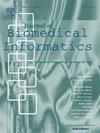Leveraging natural language processing to elucidate real-world clinical decision-making paradigms: A proof of concept study
IF 4.5
2区 医学
Q2 COMPUTER SCIENCE, INTERDISCIPLINARY APPLICATIONS
引用次数: 0
Abstract
Background
Understanding how clinicians arrive at decisions in actual practice settings is vital for advancing personalized, evidence-based care. However, systematic analysis of qualitative decision data poses challenges.
Methods
We analyzed transcribed interviews with Hebrew-speaking clinicians on decision processes using natural language processing (NLP). Word frequency and characterized terminology use, while large language models (ChatGPT from OpenAI and Gemini by Google) identified potential cognitive paradigms.
Results
Word frequency analysis of clinician interviews identified experience and knowledge as most influential on decision-making. NLP tentatively recognized heuristics-based reasoning grounded in past cases and intuition as dominant cognitive paradigms. Elements of shared decision-making through individualizing care with patients and families were also observed. Limited Hebrew clinical language resources required developing preliminary lexicons and dynamically adjusting stopwords. Findings also provided preliminary support for heuristics guiding clinical judgment while highlighting needs for broader sampling and enhanced analytical frameworks.
Conclusions
This study represents the first use of integrated qualitative and computational methods to systematically elucidate clinical decision-making. Findings supported experience-based heuristics guiding cognition. With methodological enhancements, similar analyses could transform global understanding of tailored care delivery. Standardizing interdisciplinary collaborations on developing NLP tools and analytical frameworks may advance equitable, evidence-based healthcare by elucidating real-world clinical reasoning processes across diverse populations and settings.

利用自然语言处理来阐明现实世界的临床决策范例:一项概念证明研究
了解临床医生如何在实际实践中做出决定对于推进个性化、循证护理至关重要。然而,定性决策数据的系统分析提出了挑战。方法采用自然语言处理技术(NLP)对讲希伯来语的临床医生进行访谈,并对访谈内容进行分析。词频和特征术语使用,而大型语言模型(来自OpenAI的ChatGPT和谷歌的Gemini)确定了潜在的认知范式。结果临床医生访谈的词频分析发现,经验和知识对决策的影响最大。NLP初步认识到基于过去案例和直觉的启发式推理是主要的认知范式。还观察了通过患者和家属的个性化护理共同决策的要素。有限的希伯来临床语言资源需要开发初步的词汇和动态调整停止词。研究结果还为启发式指导临床判断提供了初步支持,同时强调需要更广泛的抽样和增强的分析框架。结论本研究首次采用定性和计算相结合的方法系统地阐明临床决策。研究结果支持基于经验的启发式指导认知。随着方法的改进,类似的分析可以改变全球对量身定制的医疗服务的理解。标准化开发NLP工具和分析框架的跨学科合作可以通过阐明不同人群和环境中的现实世界临床推理过程来促进公平、循证的医疗保健。
本文章由计算机程序翻译,如有差异,请以英文原文为准。
求助全文
约1分钟内获得全文
求助全文
来源期刊

Journal of Biomedical Informatics
医学-计算机:跨学科应用
CiteScore
8.90
自引率
6.70%
发文量
243
审稿时长
32 days
期刊介绍:
The Journal of Biomedical Informatics reflects a commitment to high-quality original research papers, reviews, and commentaries in the area of biomedical informatics methodology. Although we publish articles motivated by applications in the biomedical sciences (for example, clinical medicine, health care, population health, and translational bioinformatics), the journal emphasizes reports of new methodologies and techniques that have general applicability and that form the basis for the evolving science of biomedical informatics. Articles on medical devices; evaluations of implemented systems (including clinical trials of information technologies); or papers that provide insight into a biological process, a specific disease, or treatment options would generally be more suitable for publication in other venues. Papers on applications of signal processing and image analysis are often more suitable for biomedical engineering journals or other informatics journals, although we do publish papers that emphasize the information management and knowledge representation/modeling issues that arise in the storage and use of biological signals and images. System descriptions are welcome if they illustrate and substantiate the underlying methodology that is the principal focus of the report and an effort is made to address the generalizability and/or range of application of that methodology. Note also that, given the international nature of JBI, papers that deal with specific languages other than English, or with country-specific health systems or approaches, are acceptable for JBI only if they offer generalizable lessons that are relevant to the broad JBI readership, regardless of their country, language, culture, or health system.
 求助内容:
求助内容: 应助结果提醒方式:
应助结果提醒方式:


